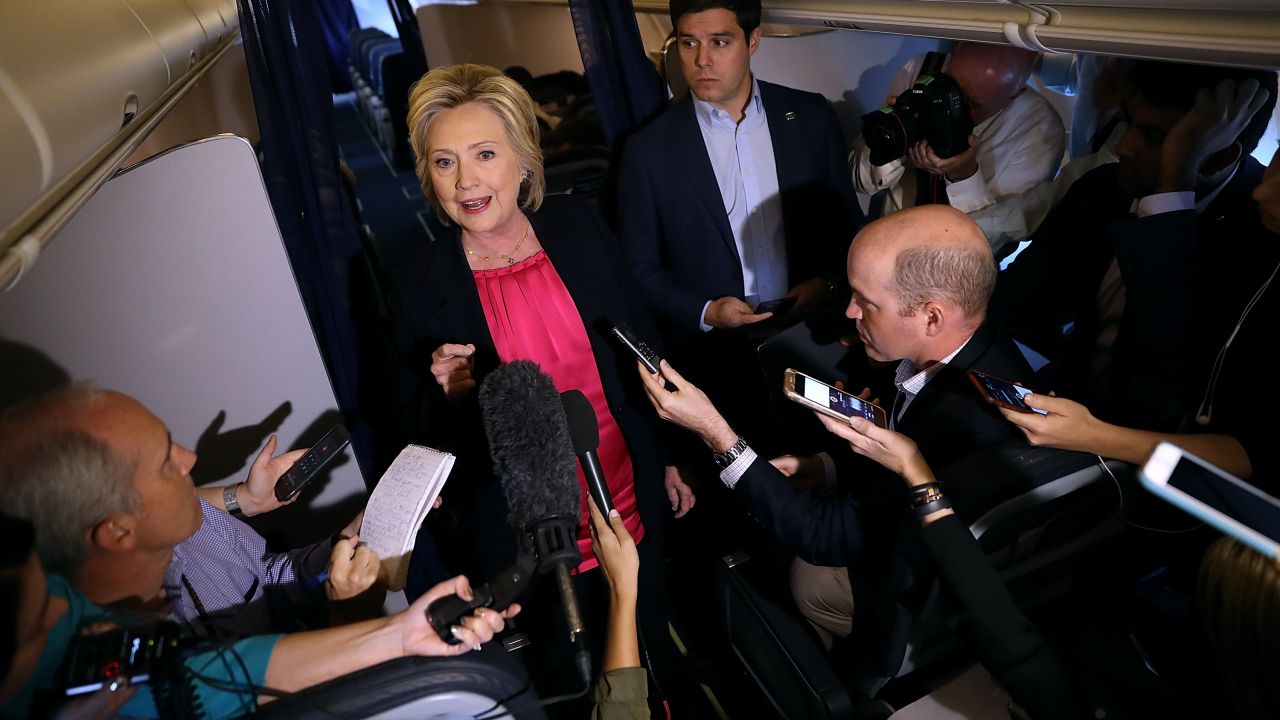
Democratic presidential nominee Hillary Clinton speaks to members of the media aboard her campaign plane. (Photo by Justin Sullivan/Getty Images)
As the late columnist Walter Winchell used to say: Onions. Onions to virtually everyone in the press corps for promoting a narrative that has, I believe, become a self-fulfilling prophecy. More than that, it is a narrative, I also believe, that undermines confidence in the election process and damages the country.

Onions (Photo: Darwin Bell [CC BY 2.0], via Wikimedia Commons)
We all know the story. This is the hate election, the lesser-of-two-evils election, the most-unpopular-candidates-in-the-history-of-modern-presidential-politics election. Everybody hates Donald Trump and Hillary Clinton. If only we had different candidates from whom to choose, the pundits say, as they roll their eyes and emit heavy sighs! No doubt, you don’t like either one of them very much. You will pull the voting lever with resignation. Or so we are told.
But I began to speculate on how much of the Hillary hatred at least (Trump was very unpopular as reflected in polling data from the get-go) was driven by the press coverage, how many Americans were effectively brainwashed into hating Hillary or felt peer pressure to join the anti-Hillary chorus because the media kept telling us how awful she was, and we didn’t want to be outliers to the hate brigade.
And while there is no definitive way to measure the impact of press coverage on public opinion, I think a fairly powerful case can be made that the media narrative created the media narrative – yet another case of political post-modernism.
The fact is that Hillary Clinton wasn’t unpopular when she announced her decision to run in April 2015. If you look at the Gallup survey in March of last year, 50 percent of Americans had a favorable impression of Clinton, only 39 percent an unfavorable one. So there was clearly no deep reservoir of Clinton hatred among the general public at the time. On the contrary: Americans liked her; they liked her quite a bit.
Already by June, however, her favorability had not only taken a hit. It had plummeted. By July, according to Gallup, her favorability hit an all-time low with only 38 percent positively and 57 percent viewing her negatively — putting her 19 points underwater.
So what happened? One theory is that Hillary Clinton is popular so long as she isn’t seeking power. As soon as she enters the elective arena, her popularity sinks. A blogger named Michael Arnovitz actually traced this phenomenon via surveys and demonstrated a correlation. His conclusion — like Todd Gitlin’s in a recent post on this site — is that Clinton’s popularity is a casualty of misogyny. There are a lot of Americans apparently who don’t like the idea of a woman in high office.
I don’t doubt it is true that Clinton is a victim of misogyny. In fact, her favorability ratings are lowest among men (34 percent last May) and especially white men (25 percent).
But Clinton has always been a woman, and her ratings have generally, until recently and with peaks and valleys, been high, and they were very high when she was Secretary of State, which isn’t a receptionist’s job. In fact, her favorables topped 60 percent throughout her tenure at State Department (2009-13), and remained at nearly 60 a year after she left (2014). So the misogyny, while undoubtedly real, doesn’t offer anything near a full explanation. It certainly doesn’t explain why her numbers nosedived last July.
A second theory that follows from the first is that Clinton’s favorability ratings are depressed by hostility from certain demographic clusters, which, one might expect, would not particularly care for her. Indeed, in this polarized environment as well as in this vehemently anti-politician environment, Clinton isn’t so much the exception as the new rule. When Clinton’s big dive began in the summer of 2015, the only Republicans who were viewed more favorably than unfavorably were Marco Rubio, Scott Walker, John Kasich, Carly Fiorina and Ben Carson, and only the last had a double-digit disparity between favorable and unfavorable. Trump’s deficit was 24 percent. And just for historical perspective, while the numbers tell us that Clinton and Trump are the most unpopular candidates in modern times, Bill Clinton in April 1992 had an unfavorability deficit of 12 percent, and George H.W. Bush, John Kerry, and Mitt Romney all had unfavorable ratings of 40 percent or more.
To get inside Hillary Clinton’s figures, only 15 percent of Republicans viewed her favorably in July 2015, as one might expect, while 75 percent of Democrats did, which one might also expect. Moreover, these figures have remained more or less steady. Though Gallup didn’t break out independents, it seems likely that they are the ones contributing most to Clinton’s plunge. Otherwise, the numbers are hardly surprising. The groups that don’t like Democrats don’t like Clinton. The groups that do, do. She continues to score well among non-whites, unmarried women, Jews, those with a postgraduate education and the poor. All of which is to say that Clinton hatred may be overstated. People who are likely to vote for Trump, roughly 40 percent of the electorate, don’t like her. Again, this may have a lot less to do with Clinton than with our political environment, though you won’t hear that in the media.
What you do hear is not only that everyone hates these candidates, but that the hatred is well-deserved. I don’t want to litigate that case for Donald Trump. But just look at last week’s pre-debate coverage on the NBC Nightly News and the PBS NewsHour, both of which I watch regularly. NBC aired a feature on a seventh-grade civics class studying the election, and guess what? These students said they were just as fed up with the candidates (plural) as the electorate is. One said the candidates (plural) behaved like children. Meanwhile, on the NewsHour David Brooks and Mark Shields, the resident solons, speculated on how “low” the candidates (plural) might go that night.
This is rampant “bothsidesism,” since everyone knows that even if you despise Hillary Clinton, even if you think every policy prescription of hers is misguided, even if you feel she is a criminal who ought to be imprisoned, she hasn’t degraded our political discourse. If anything, as Shields would say after the debate in contradiction to his own bothsiderism, she is so focused on policy she has yet to provide a larger vision of governance — another tired media narrative, by the way, that is certainly open to challenge.
Wrong-headed or not, none of this explains Clinton’s July 2015 plunge; it only certifies it. What makes that plunge somewhat baffling is that Clinton made several major policy pronouncements that month – two laying out the broad strokes of her economic policy, and another discussing race. Again, whether you agreed with these pronouncements or not, she was being a serious candidate. It certainly couldn’t have accounted for the sudden turn by voters.
But policy wasn’t what the media were focused on that July. They were focused on emails. There was a court-mandated dump of Clinton’s emails late that month, and the media leapt on it with alacrity. This certainly wasn’t the first time the public had heard about Clinton using a private email server while Secretary of State. That news had come out in March 2015 and hadn’t affected her favorability at all. But the fixation on emails, which had long been an addiction among Republicans and the right-wing media, suddenly became an addiction in the mainstream media as well. According to a Lexis-Nexis search, The New York Times, to cite one example, had seven stories that month with “Clinton” and “emails” in the headline. More important, most news sources reported erroneously that Clinton was the subject of a criminal investigation by the FBI. In reporting a sudden drop in Clinton’s popularity in its own NBC/Wall Street Journal poll that month, NBC professed not to understand why, though it had only to look at its own reporting. You could say that Clinton was sabotaged.
And that wasn’t all. As reported in a study by Harvard University’s Shorenstein Center on media coverage in the pre-primary period, Clinton received especially negative coverage — overwhelmingly negative. At the same time, both Sanders and Trump received extremely positive coverage. As the report put it: “Whereas media coverage helped build up Trump, it helped tear down Clinton. Trump’s positive coverage was the equivalent of millions of dollars in ad-buys in his favor, whereas Clinton’s negative coverage can be equated to millions of dollars in attack ads, with her on the receiving end.” And Shorenstein found there was a ratio of 45 negative stories to one positive story on the emails, much of them generated by Republicans and Fox News and picked up by mainstream media, who readily quoted the Republicans. Eighty-four percent of Clinton’s coverage in this period was negative in tone. Moreover, her coverage in the primary period, as studied by Shorenstein, continued to be disproportionately focused on emails and continued to be heavily negative — 10 negative stories for every positive one.
The transition from the story of the emails to the story of unpopularity itself followed as night does day and rapidly gained a momentum all its own, to the point where it is now quite possibly the central narrative of the election. (Why this happened is not my focus here, though it has a lot to do with the media’s overarching cynicism that puts them above the fray.) Maybe this doesn’t matter much. Maybe Clinton would have torpedoed her own popularity, even without a media assist. Maybe. But with all the condemnation of Trump’s unconscionable declaration that he might not accept the results of the election should he lose, the media conveniently ignored their own nearly 18-month denigration of the democratic process. To insist that both major candidates are unworthy is one thing. It may even be true. To drive a narrative of unworthiness that, at least in Clinton’s case, didn’t exist until the media conjured it, is another.
This isn’t a defense of Hillary Clinton. The press should be critical of all candidates when warranted. It is rather a defense of our traditional tolerance for the imperfections of democracy, which are undeniable, and for our traditional belief that you don’t chuck the system, you improve it. The miasma that hangs over this election and that has exasperated and angered so many Americans emanates from the idea that the system that coughed up these two candidates has failed the voters miserably and irrevocably. It is an idea that, again, in some ways echoes Trump’s own self-serving sabotage. The media, reverting to their negative and cynical default, have worked very hard to convince us we have an unacceptable choice between two terrible candidates, so much so that most of us think this was our idea all along.
It wasn’t — not before July 2015. But now that our faith in the political system is gone, will the media who hammered away at it help restore it?

Orchids (Photo: Ramesh NG [CC BY-SA 2.0], via Wikimedia Commons)
So let me also award orchids (H/T Winchell) to two pundits who have bucked the narrative: Paul Krugman of The New York Times and Ezra Klein of Vox. Klein said last week that Hillary Clinton won the debates not only because her opponent is unhinged, but also because she destroyed him through preparation, strategy and smarts. Krugman goes even further, writing that Clinton, warts and all, is a worthy candidate without needing Trump to put her worthiness in relief. “She’s a formidable figure and has been all along.” A decent and formidable candidate. Now that’s a revelation.




